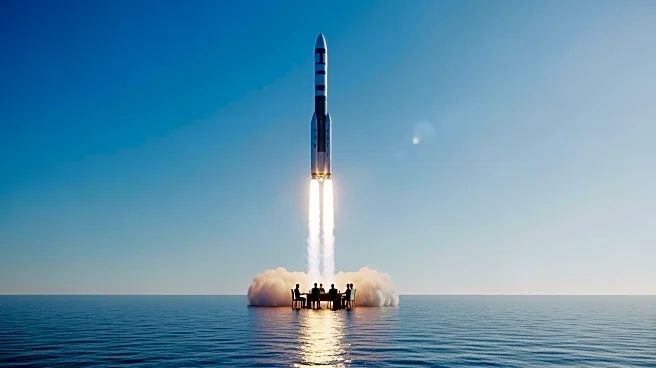What's Happening?
SpaceX conducted the 11th test flight of its Starship rocket on October 12, achieving all mission objectives. The test involved the Super Heavy booster and the Ship upper stage, both designed for reusability.
The booster hovered in mid-air before plunging into the Gulf of Mexico, marking its second flight and successful re-use. The Ship upper stage completed a soft landing in the Indian Ocean. This test is part of SpaceX's efforts to develop a fully reusable rocket system, crucial for future Mars missions and NASA's Artemis 3 lunar mission. The test also included deploying Starlink mass simulator satellites and testing new engine burn sequences.
Why It's Important?
The successful test of SpaceX's Starship rocket is a significant milestone in the company's goal to establish a permanent human presence on Mars. The reusability of the Super Heavy booster and Ship upper stage is critical for reducing costs and increasing the frequency of launches. This development also supports NASA's Artemis 3 mission, which aims to return astronauts to the moon by 2027. The advancements in rocket technology demonstrated by SpaceX could accelerate space exploration and commercial space travel, impacting industries related to aerospace, technology, and international space collaborations.
What's Next?
SpaceX plans to continue refining the Starship system, with future tests focusing on catching the Super Heavy booster and Ship upper stage using the launch tower's mechanical arms. The first attempt to catch the Ship stage is expected in early 2026. These developments are crucial for meeting NASA's timeline for the Artemis 3 mission. SpaceX's ongoing improvements will likely influence the company's ability to secure contracts and partnerships for future space missions, potentially expanding its role in global space exploration efforts.
Beyond the Headlines
The successful test highlights SpaceX's innovative approach to rocket design, emphasizing reusability and cost-efficiency. This could lead to broader implications for the space industry, encouraging other companies to adopt similar technologies. The focus on Mars colonization reflects a shift in space exploration priorities, with long-term goals of interplanetary travel and habitation. Ethical considerations regarding space colonization and resource utilization may arise as these technologies advance.









